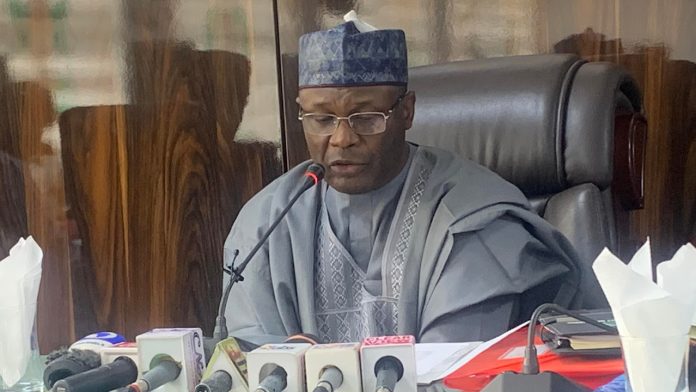Chairman of the Independent National Electoral Commission, ( INEC), Professor Mahmood Yakubu, has admitted that the Commission experienced glitches in transmitting results through the IReV during the presidential elections.
He acknowledged this while giving a critique of technological innovations deployed during the elections on Monday, at a session with Civil Society Organisations, ( CSOs) on the review of 2023 General Elections.
Professor Yakubu in his clarification also declared that “there was no direct funding or cash support from international development partners.”
He maintained that the development partners “support was totally indirect through civil society organisations and implementing partners working on elections.”
Thanking the civil society organisations and development partners for their enormous support to the Commission during the 2023 General Elections, the INEC Chairman recalled that while 228 groups (190 domestic and 38 foreign) were accredited as observers for the last general elections, only 67 have so far submitted their observation reports to the Commission.
He said:” On this note, it is appropriate for the Commission to express its appreciation to civil society organisations and development partners for their enormous support to the Commission during the 2023 General Election. This came in the form of technical advice, civic and voter education, organisation of meetings and capacity-building workshops, as well as the publication of documents.
“However, it is necessary to seize this opportunity to correct the impression in some sections of the public that the Commission received huge sums of money from development partners for the election. On the contrary, and for the avoidance of doubt, the Commission did not receive any direct funding or cash support from international development partners. Rather, their support was totally indirect through civil society organisations and implementing partners working on elections. Indeed, it has been a longstanding policy of the present Commission not to receive direct funding and cash transfers from sources other than the Federal Government of Nigeria. We hope that we shall continue to have this type of productive partnership with civil society and development partners in the future.
“It is in furtherance of this partnership that the Commission accredits observers because the feedback we receive, and their actionable recommendations have been very helpful to the electoral process. For the 2023 General Election, the Commission received 538 requests (504 domestic and 34 foreign) for accreditation as observers. After a thorough evaluation of the requests, only 228 groups (190 domestic and 38 foreign) met the requirements for accreditation. However, so far, only 67 observer groups (62 domestic and five foreign) have so far submitted their observation reports which represents just about 30% of the accredited groups for the election. We urge all accredited observer groups that are yet to submit their reports to do so in earnest.”
Giving a critique of technological innovations deployed during the elections, the INEC Chairman said the accreditations of voters using the Bimodal Voter Accreditation System (BVAS) and the uploading of results to the INEC Result Viewing Portal (IReV), were successful.
” The accreditations of voters using the Bimodal Voter Accreditation System (BVAS) and the uploading of results to the INEC Result Viewing Portal (IReV), were successful but the Commission experienced glitches in transmitting results through the IReV during the presidential elections,” he admitted.
Professor Yakubu also revealed that activities of thugs deployed by politicians made the election day administration very difficult.
He said: Nevertheless, as you are aware, there were many challenges encountered before and during the elections. The severe cash and fuel situations were compounded by the perennial insecurity nationwide. Their impact on our deployment plans, compounded by the behaviour of some of our own officials in the field, made logistics management particularly challenging.
The deployment of thugs by some political actors made election day administration difficult in a number of places. While voter accreditation using the Bimodal Voter Accreditation System (BVAS) was very successful, the uploading of results to the INEC Result Viewing Portal (IReV), especially for the presidential election, encountered a glitch as explained in our statement released by the Commission on 26th February 2023. The Commission is aware that this matter is currently the subject of litigation and would reserve its comments for now. Nevertheless, the performance of the technology deployed for the election is part of the ongoing review of the 2023 General Election. It will form an integral part of the comprehensive report that will serve as a basis for further engagement with stakeholders focusing on specific actions necessary for the improvement of future elections and electoral activities in Nigeria.”
Share your story or advertise with us: Whatsapp: +2347068606071 Email: info@newspotng.com














